W EST S IDE S TORY

WSS covers recent legi s l a t i o n regarding censorship and the LGBTQ+ c o m m unity in classrooms.



WSS covers recent legi s l a t i o n regarding censorship and the LGBTQ+ c o m m unity in classrooms.

Ceci DeYoung
Sabrina Du ‘25 swims breaststroke in the 200 IM relay at the Coralville Recreation Center Sept.12. The Trojans, on a winstreak since the start of the season, won 143-39 against Cedar Rapids Jefferson.

Hey there!
Welcome back to West High, Trojans! I hope you had a great start to your year and are excited for the months ahead. With a new year comes new faces, turn to pages 10-11 to read about the new faculty members at West and play two truths and a lie.
This issue’s cover story is about the changes with education in Iowa. To learn about book bans, curricula changes and LGBTQ+ legislation, flip to pages 16-19.
Despite the year only just beginning, athletes are already making names for themselves. Head over to pages 22-23 to read about some rising stars.
As we head into fall, you might find yourself craving some seasonal treats. Turn to page 28 for a quiz and new recipes.
I hope you enjoy this first issue and have a great year. I can’t wait to see what it will bring!
ZAIRA AHMAD (she/her)
Mailing address: 2901 Melrose Ave., Iowa City, IA 52240
Website: wsspaper.com
Email: westsidestorypaper@gmail.com
West Side Story reflects the views of the staff and does not necessarily represent the opinions of the school administration, faculty or student body. Students who want to join WSS should enroll in Foundations of Journalism. For more information, go to wsspaper.com/join.
Mailing address: 2901 Melrose Ave., Iowa City, IA 52240
Website: wsspaper.com/ads
Email: westsidestorybusiness@gmail.com
Letters to the editor may be submitted to room 111, emailed to westsidestorypaper@gmail.com or mailed to the school. All letters must be signed. Names will be published and identities verified by the opinion editor. Letters must not contain personal attacks against an individual and may be edited.
The WSS strives to correct its errors. If you notice any inaccuracies, contact westsidestorypaper@gmail.com.
It is the policy of the Iowa City Community School District not to discriminate on the basis of race, creed, color, religion, national origin, gender, age, martial status, sexual orientation, gender identity, veteran status, disability, or sociaeconomic programs, activities, or employment practices. If you believe you have (or your child has) been discriminated against or treated unjustly at your school, please contact the Equity Director, at 509 Dubuque Street, 319-688-1000. Please contact westsidestorypaper@gmail.com for questions or comments.
MCCARTNEYInstagram: @wsspaper & @westhighathletics
Twitter: @wsspaper & @wssathletics
Facebook: @wsspaper
Tiktok: @wsspaper
YouTube: West Side Story
*Editorial Board Member
Zaira Ahmad* (she/her) Print Editor-In-Chief


Grace Bartlett (she/her) Reporter
Maddy Cook (she/her) Reporter
Lilly Graham* (she/her) Managing Editor
Carter-Birch Houchins-Witt (he/him) Reporter
Reem Kirja* (she/her) Profiles Editor
Kamakshee Kuchhal* (she/her) Copy Editor
Jane Lam* (she/her) Assistant Copy Editor
Jessie Li* (she/her) Assistant Copy Editor
Gianna Liu* (she/her) Photo Editor, Sports Editor
Ginger McCartney* (she/her) Art Editor
Helen Orszula (she/her) Artist, Designer
Mrudani Ramkumar* (she/her) News Editor
Celia Sadewasser (she/her) Intern
Tyler Shane (he/him) Intern
Zoe Smith (she/her) Online Editor-In-Chief
Anna Song* (she/her) Assistant Design Editor
McKenna Stephens (she/her) Designer
Marie Stier* (she/her) Feature Editor
Henry Timmer-Hackert* (he/him) Assistant Opinion Editor
Erinn Varga* (she/her) Design Editor, Opinion Editor
Sara Whittaker (she/her) Adviser
Athena Wu* (she/her) Entertainment Editor
FRONT COVER DESIGN BY GINGERAs the days get colder and fall approaches, take a look back at the events that marked the beginning of the school year.




This year, students were met with many new policy changes. Parking passes are now free after previously being $5. In addition, the school will tow cars without passes and students’ cars parked in the teacher lot, bus lane and fire lane. Advisory has returned to West and takes place on Wednesdays. Students will have the same Advisory teacher for every year they are at West.
U.S. News and World Report ranked West High the #1 high school in Iowa and the #398 school in the United States. U.S. News took factors such as college readiness, graduation rate and state assessments into consideration for this ranking. Liberty High and City High also ranked #6 and #12 in Iowa, respectively.



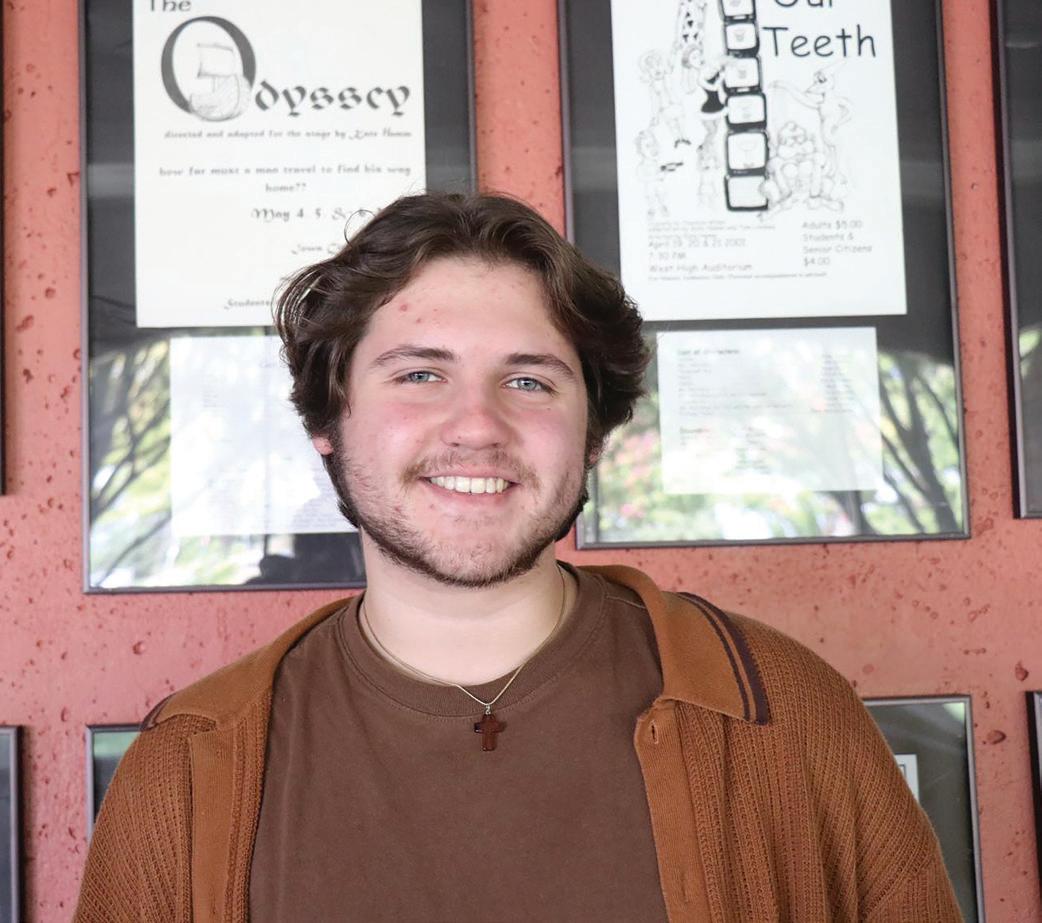


Theatre West is showcasing “A Christmas Carol.” Auditions for the fall production took place in the Arganbright Auditorium. 39 students are acting in the show with Andreas Warren ’24 playing Ebenezer Scrooge. The production will be held Nov. 30 to Dec. 2, and tickets are sold online at theatrewesthigh.com.
 PHOTO B
PHOTO B
The club fair took place in the cafeteria during Advisory and sixth period. 48 clubs participated in the club fair including new clubs such as Table Tennis Club, Film Club and Pickleball Club.
Vismitha Vuppala ’24 sets up the HOSA poster for the club fair Sept. 13.
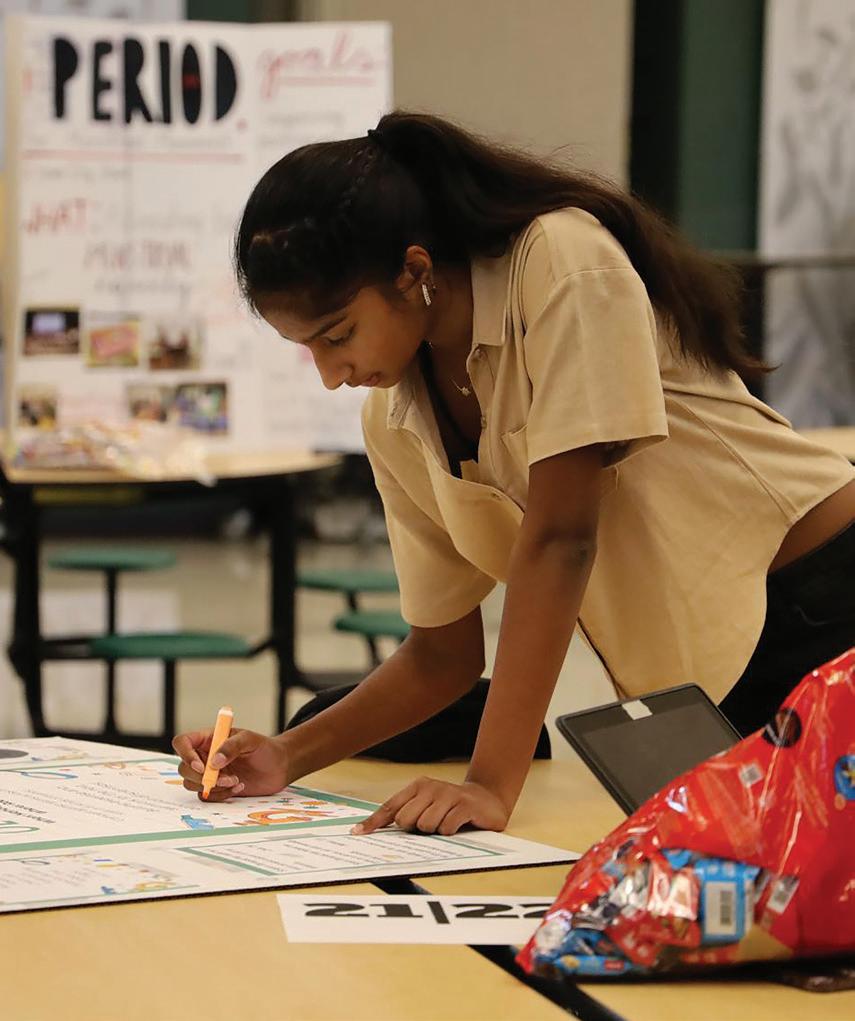




Homecoming kicked off with spirit week including themes like pajama day, t-shirt signing day, Adam Sandler day, anything-but-a-backpack day and green and gold day. A homecoming parade honoring the Heroes of Troy nominees took place Sept. 20 in Galway Hills and featured sports, band and more. The Mamma Mia-themed homecoming dance took place at West High Sept. 23. The six Heroes of Troy included seniors Aidan Jacobsen, Ankur Karandikar, Cindy Wang, De’Jah Jordan, Zaira Ahmad and Zoe Smith.
Winners of the Hero of Troy pose at Homecoming Sept. 23.


Mason Goering ’26 and Izaiah Loveless ’24 lead the Trojan team onto to the field for their first home game of the season Sept. 8. The boys dominated Muscatine High School winning 42-20.
Following their 35-28 win against Liberty in the season opener Aug. 25, the Trojans played the Little Hawks in the 55th annual Battle for the Boot Sept. 15. The game took place on Bates Field at City High with the Trojans losing to the Little Hawks 23-8. West faced Ankeny Sept. 22 in the Homecoming Game and lost 48-21.
 PHOTO BYELENAGARCIA
PHOTO BYELENAGARCIA
West High’s Phase 3 Facility Master Plan renovation is set to be completed by fall 2025 and will include new main and guidance offices, musical facilities and a common space.

Continuous renovation and improvement have marked West High’s 55-year history. Past projects include the addition of the 9th Grade Center (West Wing) in 2004 and the more recent Phase 1 and Phase 2 renovations, which involved adding the south gym and installing Geothermal Heating, Ventilation and Air Conditioning (HVAC) throughout the entire building.
Despite these upgrades, West remains affected by issues that come with being an older facility still in need of further refurbishing.
“If we know anything about American architecture from the 1960s, it’s not known for its glamor or cutting-edge design,” Principal Mitch Gross said. “West is kind of the middle sibling of the three high schools, and sometimes, middle siblings get forgotten. To some extent, that has happened here.”

Until the Phase 3 renovation, West’s choir room remained unchanged from 1968, making it the last of the secondary choral or orchestral rooms to be renovated within the ICCSD. David Haas, who teaches Music Production and is West’s Director of Choral Music, has experienced the downsides of teaching in a dated choir room.
“All three major ensembles lived in [the choir wing], so the acoustical treatment had to be congruent for the orchestra and the choir ... meaning the room wasn’t acoustically as alive and rewarding to sing in,” Haas said.
The old choir room included embedded tiers, which were well-suited for curricular choir but did not allow for space to accommodate show choir rehearsals. Gross also recognizes that one of the most significant challenges facing West is limited space.
“We probably still need to add space; right now, [there are] four temporary solutions [outside],” Gross said. “My goal is to never have teachers have to share rooms, [but] we’re getting to that point if we don’t make changes.”
An art rendition shows the future appearance of the front of West High.
The current Phase 3 renovation can be traced back to September 2017, when voters within the ICCSD passed a $191.5 million construction bond. Known as the 10-Year Facilities Master Plan, it provided funding for facility improvement across all levels of the district, including West High. West’s renovation was broken down into stages, with Phase 1 completed in 2018 and Phase 2 in 2021.
Phases 1 and 2 couldn’t meet all of West’s upgrade needs, so the ICCSD rehired the architectural and engineering firm Shive-Hattery, which designed the previous renovations, to plan West’s third phase of upgrades.
Last October, the Iowa City School Board unanimously passed Shive Hattery’s Phase 3 design proposal, which will also be funded by the 2017 construction bond.
The main priorities for Phase 3 include clearly defining the main entrance while increasing its security.
Jerica Grabner, an architect with Shive-Hattery who specializes in K-12 facilities, was a member of the team tasked with reconfiguring West’s front exterior. She found the input from West student focus groups inspirational for her design.
“[Students] talked about wanting a really strong entrance that they can be proud of, something prominent, and also preserving the [front] stairs, finding a way to integrate them into the new facade,” Grabner said. “We’re creating this really dramatic geometric feature at the front of the building, so it’s going to be very clear … that’s where you [now] enter.”
Grabner’s design focused on retaining the main staircase and integrity of the original structure, while still incorporating a clear main entrance.
“When I’m looking at a building, a lot of times, I just feel like it tells me what it wants to be,” Grabner said. “ I really want [renovations] to look like it’s a piece of the building and [be] respectful to the original architecture.”
The $10.6 million Phase 3 project will focus on improving administrative, communal and academic settings. Along with revamped main and guidance offices, the front entrance will be more secure and feature a new student commons, which will serve as a gathering space for students during open hours. For the first time since the construction of the West Wing, West will add four to five more classrooms, located on what is now the second floor of the library. New orchestral and choir facilities are also a central component of the renovation.
Haas is looking forward to the ample natural light and enhanced flexibility of the new choir room, which will no longer include permanent tiers.
“Hopefully, if the choir is rehearsing in these rooms and [with] the windows, people will be able to see the choir ... and maybe consider joining their friends and participating in something they didn’t realize they were missing [out on],” Haas said.
Several adjustments were made this school year to accommodate the renovations. Choir has been relocated to the band room, and the guidance offices are now housed in the library. Parking is even more limited, as teachers are no longer able to park in the front lot near construction.
“It’s a lot of moving parts, and people have been displaced, but the displacement is just temporary,” Gross said. “I’ve actually heard a lot of students say they can’t even tell a major construction project is going on.”
Despite the inconvenience renovation entails, Gross holds that it is crucial to continue improving West’s building. In the future, he hopes to replace the portable classrooms with an addition that will enclose the courtyard.
“It’s always evolving, we’re a growing building and district,” Gross said. “You can’t ever become static with a facility; you have to be upgrading and keeping it nice constantly.”
WARNING: This article contains depictions of death and graphic violence.
Television screens flick through various channels, each showcasing unique turmoil—climate change, deforestation and the Russo-Ukrainian war. However, one topic isn’t receiving the same extent of coverage, instead dismissed as everyday African normality: the Sudanese Civil War. The crisis erupted during Ramadan, on the morning of April 15, with exchanges of military violence between the Sudanese Armed Forces (SAF) and the Janjaweed Rapid Support Forces (RSF) paramilitary. The opposing groups have partaken in political disagreements since overthrowing war criminal and former President Omar alBashir in the 2019 coup d’état. Without a proper hierarchy of authority, the Republic of Su-
tary-based fight, the Sudanese people remain at the heart of the crisis.

According to The United Nations Office for the Coordination of Humanitarian Affairs (OCHA), as of Sept. 5, around 5.1 million individuals in Sudan are internally displaced, and over one million fled to neighboring countries. In addition, some families have been separated due to document rejections during travel.

For the Sudanese community at West, the unexpected clashes have led to the loss and displacement of loved ones. Bashir Eltyeb ‘25 recognizes the difficulties that come with the crisis.
“When I first heard about the war, my aunts and uncles were living [in Sudan]. My grandma died during the war [because of her health], and I’ve had some rough times,” Eltyeb said. “Compared to other Sudanese people, I’m thankful because I’m not in Sudan. There are so many people that are struggling right now, and I wish I could help them.”

While he isn’t directly affected by the conflict, Eltyeb finds it challenging to be reminded of the dire situation his loved ones are facing.
“Knowing that my friends are not safe is always kind of scary to me,” Eltyeb said. “I’ve shared birthdays with these people. I went out with them, and I saw them at school—and right now, I could just wake up and get a text that they’re dead, and it’s scary.”
Despite the hardships, Eltyeb has started thinking of the war from a different perspective.

“The war helped me connect more with reality,” Eltyeb said. “I had a moment of emotional resilience, where I’m trying to understand why this war is happening and what we can really do about it. You have to understand that people are being affected by [the war] and that you have a duty to your country.”
Eman Mohamed, a West High parent, recounts how she felt when she first heard of the war.
“I was shocked and numb,” E. Mohamed said. “I didn’t know what to do because my family was

isolated in the middle of the violence. I broke down and just started crying from the shock.”
Due to continuous difficulties with communication, the U.S. receives updates of the war after a prolonged period of time. As a result, E. Mohamed discovered her nephew was included in the first death count after his funeral.
“My nephew was one of the first people killed during the beginning hours of the shootings,” E. Mohamed said. “He was taking his final exam at the university, and he was going to his car when suddenly, he heard gunshots and was on the ground. He was shot in his kidney, and no one could help him for days.”
Along with familial losses, the conflict has deteriorated Sudan’s already faltering education system. While schools have been repurposed as shelters for displaced individuals, the lack of supplies has immobilized the education they once provided. For Rawan Babiker ‘25, this means her cousins don’t have the materials to continue their studies.
“It was testing season [before the war], and my cousins weren’t able to test. They couldn’t even go to the schools they had planned,” Babiker said. “They now have to go to other cities and see if colleges are gonna take them. Some of [my cousins] weren’t even able to graduate.”
In addition, the conflict is exacerbated by the destruction of the Sudanese healthcare system. According to OCHA, around 80% of hospitals and pharmaceutical storages are out of service, and civilians are dying due to the lack of medical resources. The primary assassination targets of the RSF are healthcare providers, severely hindering the productivity of hospitals. As a result, Babiker experienced the loss of her cousin.
“[My cousin] didn’t die because somebody shot him. He got really sick and tired, and he went to the hospital. But because of the war, there were

In the first successful military coup, civilian Ismail al-Azhari overthrows the government with Prime Minister Abdallah Khalil, resulting in mil -
President Ibrahim Abboud resigns after a civilian revolution, resulting in the era of council democratic rule.
Colonel Jaafar Nimeiry coups the council’s democratic rule and assumes military control.




Source: Vox
no resources to help him,” Babiker said. “There was no oxygen in the hospital and that’s why he passed. There were no IVs and no doctors to help him.”
Hopes of returning to Sudan have slowly dwindled amongst the Sudanese. The RSF continues to post pictures of their exploits on social media, such as the sexual violence of young women and the destruction of citizen properties. E. Mohamed recognizes that the war connects to an overall humanitarian abuse crisis.
“There are corpses on the streets, and no one can bury them because they would get shot by the Janjaweed, the paramilitary,” E. Mohamed said. “Dogs and cats are starving because there’s no one to feed them, so they’re eating the bodies scattered around. Some of the people that are dead are floating in the Nile River, and my cousin can smell rotting bodies around his house.”
Although the return of Sudanese refugees might be delayed, several organizations in the U.S. are raising money to aid those devastated by the war or those forced to flee their homes, such as the Sudanese American Physicians Association (SAPA). SAPA is a non-profit, humanitarian membership-based organization for medical professionals, and they are committed to ensuring that Sudanese refugees have access to prompt healthcare needs. Khidir Dalouk, a SAPA executive board member and the Director of Advocacy, explains how SAPA strives to reach its goals.
Civilian revolutions begin amidst a huge economic crisis, leaving millions of Sudanese struggling for basic needs. This results in the overthrowing of al-Bashir in 2019.





Colonel Omar al-Bashir coups Sadiq al-Mahdi, becoming the head of state. AlBashir instills “coup-proofing”, a system intended to spread power between his allies and prevent overthrowing his military rule.
Military Officer






Abdel Rahman

Swar al-Dahab overthrows Jaafar Nimeiry and reinstalls a democratic government, helping Sudan once again thrive.
“We’re working on different strategies to boost the public health sector during this very difficult time, [such as] by supporting and funding different hospitals across Sudan. We are launching new facilities to help alleviate the pressure on different hospitals,” Dalouk said. “We have a team who is dedicated towards internally displaced persons. We’re ensuring their housing, food security and health [is taken care of].”
With Sudan’s history of coups, some expected the crisis to resolve after a few weeks. However, global powers’ interference with obstacle-free resource extraction has escalated the war. Mohamed Mohamed, a paraeducator at West High, believes that external countries aligning themselves with one of the two fighting groups has only made matters worse for the civilians.
“A majority of the world is neutral, and some are siding with the RSF either because the militia has investments in their country or for resources,” Mohamed said. “The countries siding with the militia don’t make sense to me because they have their own land, their own people, their own resources, so I always wonder, ‘Why are they trying to take what’s ours?’ It’s upsetting because most of the RSF are not even Sudanese, and they are trying to take over our country with the support of others.”
Donations have poured in from sympathetic Sudanese citizens and Muslim communities around the U.S. However, Dalouk believes the world’s weak response to Sudan’s conflict is af-
fected by prejudice.
“Apples and oranges are not equal,” Dalouk said. “We’re not getting the same media attention. We’re not getting the same attention that the Biden administration is giving, for example, to Ukraine. So we’re not very happy with the way the world is standing up for this war.”
E. Mohamed also views the static world response as disappointing.
“Everything is in mayhem, and if we had an ounce of positive standing from the world, we wouldn’t have been in such a critical situation,” E. Mohamed said. “I can’t help but compare [the world’s] response to a European country in danger versus an African country in danger.”
Though international assistance is faltering, Babiker and Eltyeb hope to create an encouraging community within West by reviving the Sudanese Student Organization (SSO). Eltyeb believes connecting with individuals of a similar cultural identity creates an intertwined support system.
“The fact that you know there are other Sudanese people around you [helps] you maintain the identity you have. You’re not alienated here,” Eltyeb said. “It’s a lot more comforting to be here in the presence of other Sudanese people because you know [they had] similar experiences and have been affected by the war too.”
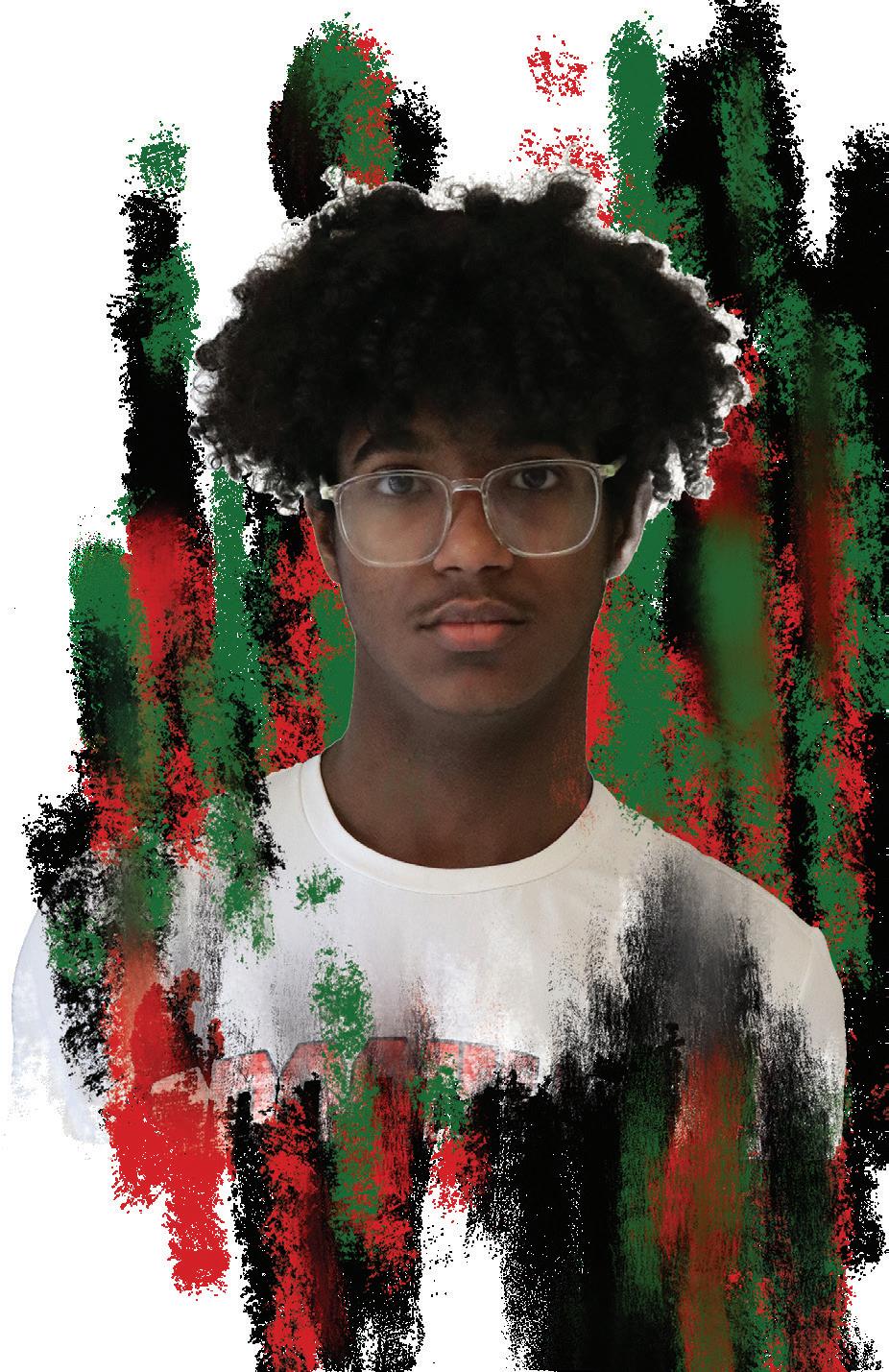
After teaching at Muscatine High School for five years, Boehmenow teaches Spanish I and IV at West. Boehme grew up in Milo, Iowa and studied biology and Spanish at the University of Northern Iowa. She then pursued her master’s degree in Spanish education at the Pontifical University of Salamanca. Boehme’s love for learning languages is not limited to just teaching Spanish. She’s studying Portuguese and Arabic, with a 950+ streak on Duolingo. Outside of the realm of languages, she loves to run, crochet and spend time with her pets.
With 16 years of experience at Davenport Central High School, Zeglis is now a band director at West. He grew up in Spring Valley, Illinois and attended Western Illinois University for his undergraduate degree in music business. After getting his master’s degree at the University of North Texas, Zeglis returned to Iowa for his teaching license. Outside of school, he often plays at local gigs as a percussionist on the weekends. He also enjoys spending time with family, playing golf and participating in triathlons.
Gardner teaches Construction Technology, Construction Materials Processing l and Geometry in Construction at West. Previously, he taught in Mount Vernon, Cedar Rapids, Jefferson and Teru, New Zealand; he is starting his 16th year of teaching. Gardner grew up in Lawton, Iowa and attended the University of Northern Iowa, graduating with a Bachelor of Arts in earth science and science education. When he’s not at school, Gardner is a busy father of two and enjoys building, hunting, fishing, kayaking and hiking in the mountains.
Bronner is one of West’s two new guidance counselors, and he coaches football. He was a counselor at Page High School in Franklin, Tennessee before returning to Iowa for his second year of counseling. Bronner grew up in Cedar Falls, Iowa and received his undergraduate degree in business instruction at the University of Northern Iowa and his master’s in school counseling at the University of Iowa. Having enjoyed coaching since college, Bronner looks forward to also coaching baseball this spring. When he’s not at school, Bronner can be found golfing or running.
James teaches Composition I and English 10 at West, and this is his sixth year teaching. Previously, James was an English teacher at North Central Junior High and a substitute at Liberty High. He grew up bouncing around the Midwest and attended the University of Iowa for his undergraduate degrees in philosophy and world literature. Besides being a bookworm, James loves making music. He spends his free time in his home studio and performs locally. James plays many instruments, such as the keys, guitar and bass, and he writes his own lyrics.
Long teaches Human Anatomy and Physiology, Earth and Space Science and voice lessons at West. With previous teaching experience in Cedar Rapids and Pueblo, Colorado, this is her 10th year as an educator. She grew up in Minnesota and graduated from Luther College with an undergraduate degree in music and biology. After realizing her passion for the environment, Long attended Clark University for her master’s degree in teaching. Her love for nature can be seen in her hobbies as well; Long enjoys birdwatching, swimming, paddle boarding as well as singing in her church’s choir.
1. She has participated in the Chicago Marathon.

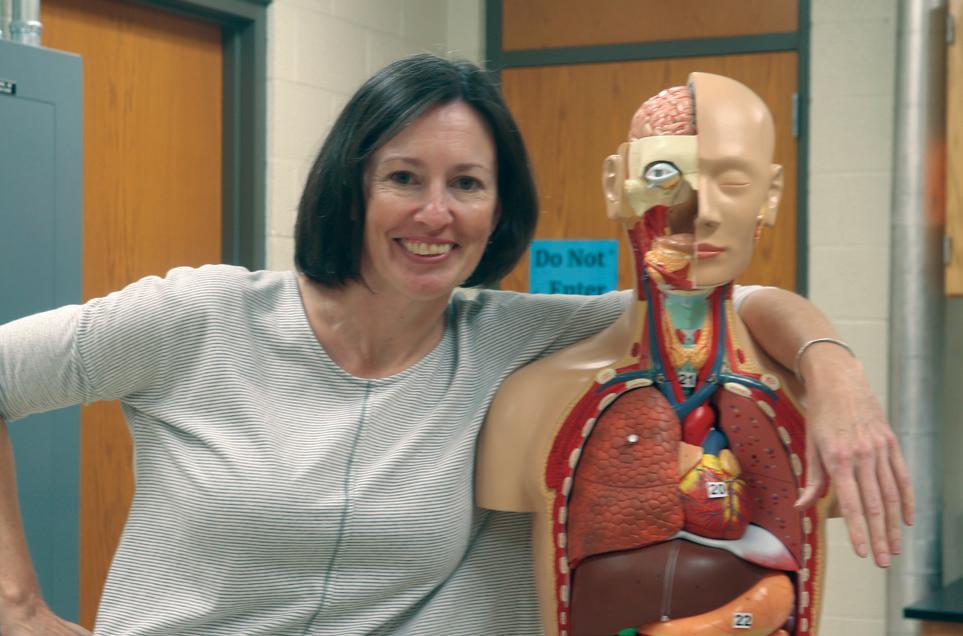
2. She received her master’s degree in Spain.
3. She played rugby in high school.
1. His extended family owns the world’s largest Christmas shop in Frankenmuth, Michigan.
2. His favorite sports team is the Chicago Cubs.

3. He is currently training for a marathon.
1. He played football and wrestled in high school.
2. He has seen Justin Timberlake in concert four times.

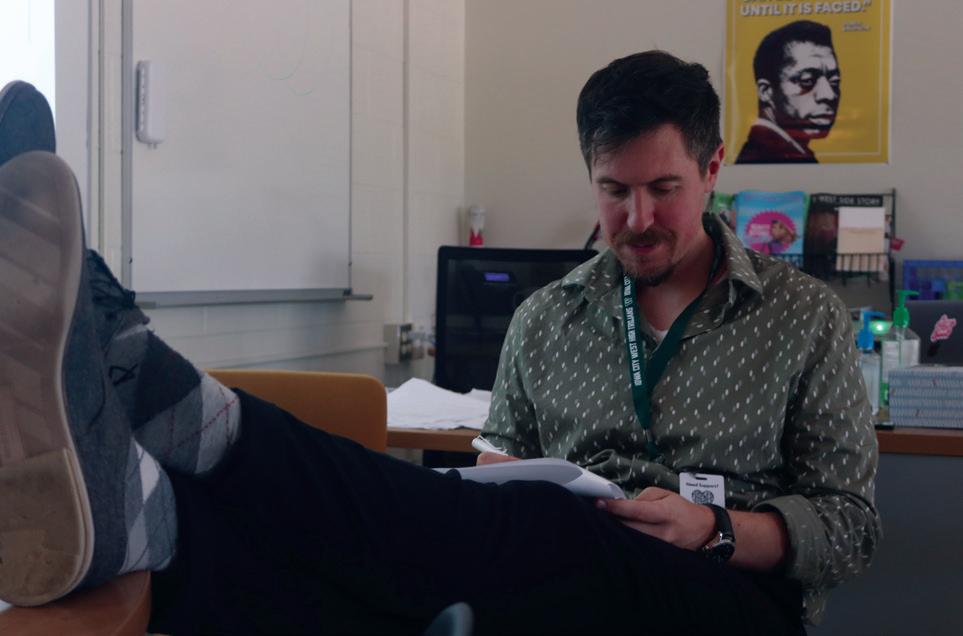
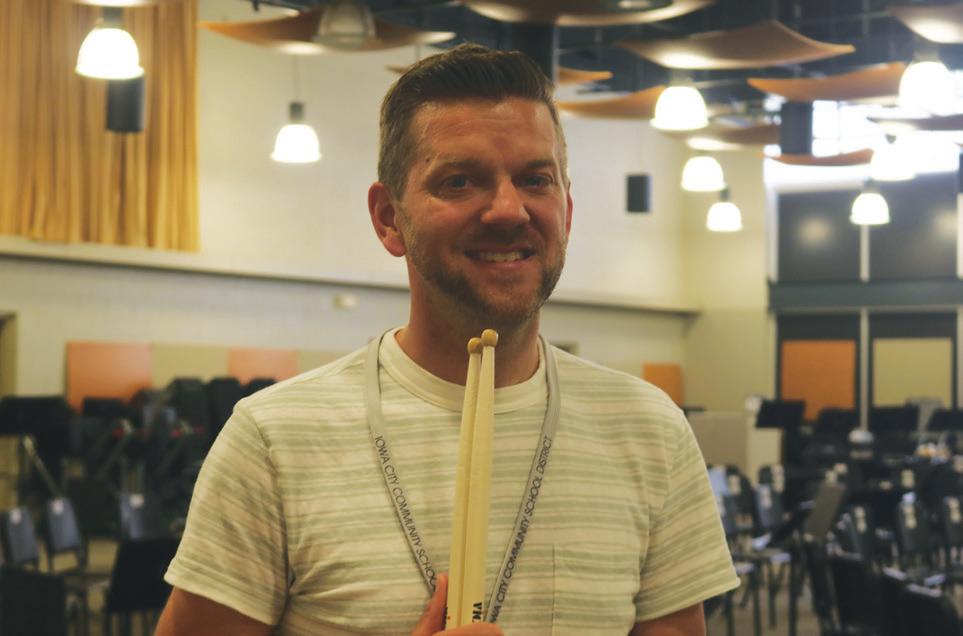
3. He played the drums at the 2013 presidential inauguration.
1. He has participated in semi-professional wrestling events.
2. He has over 3.5 million plays on Spotify.
3. He has three dogs.
1. His favorite color is orange.
2. He has been to eight countries.
3. He is 38 years old.
1. She lived in West Africa for eight years.
2. She can do a backflip.
3. She skinned birds for a natural history museum as a work-study job.
rabbing her sewing machine, she imagines intricate designs tailored for her client. She begins to work immediately, rummaging through colorful fabrics. After a few days, the result is a vibrant, patterned tote bag. This is how Charlotte Delowery ’24 runs her small business, CharlieBellCreations.
For many, starting a business is a means of making a profit. However, for Delowery, her love for sewing blossomed at a young age and led her to be the entrepreneur she is today.

“I grew up sewing. My great-grandma sewed, and she made clothes … What changed the game for me was a summer camp with Helmick Workshop in Iowa City; it was so cool because I was able to learn how to sew with someone guiding me. It taught me that, ‘Wow, this is really important to me,’” Delowery said. “What really got me started was giving back to my community, like making masks for people. That was important to me.”
Delowery started her business in 2020 at the peak of the COVID-19 pandemic. Using fabric
from people in the community, she sewed masks in exchange for more fabric. Following the pandemic, Delowery hoped to repurpose the many pieces of leftover material.
“By the time people stopped wearing masks, I had so much [leftover fabric],” Delowery said. “I started making other things like scrunchies, little makeup cases and tote bags and expanded into making full-blown aprons, dresses and extravagant backpacks.”
Business teacher and Business Professionals of America advisor Diane Fickel noticed Delowery’s inclination for business as a freshman in Entrepreneurship.
“She just seemed to be beaming every time she walked in the door. She was in her element, being with like-minded people [who] wanted to start a business,” Fickel said. “All of a sudden, she started staying after class and asking me questions about her business idea. I realized that she had actually started a business; we connected at that level.”
Recounting her time with Delowery, Fickel
describes how her entrepreneurial skills have helped build her character.
“She [has] the whole entrepreneurial package because she has people skills, finance skills, creativity, innovation, design, marketing and she’s willing to step out of her comfort zone,” Fickel said. “That’s what it takes to be an entrepreneur—she’s willing to, most importantly, take a risk.”
As such, Delowery has tried many different mediums of art to further adapt her business.
“Recently, I’ve been upcycling old clothes into denim and T-shirt bags. People will bring me their old jeans or T-shirts, and I’ll make them tote bags, pencil cases, aprons or anything like that,” Delowery said. “It’s been pretty fun to be able to [take] people’s [old] items and make them into something new.”
Delowery recognizes the importance of advertising her business through various platforms. She began selling on Etsy and even created her own Shopify website. Delowery also promotes her business on social media as well as around the local community. She can be found at the Iowa City Farmers Market in the Chauncey Swan Ramp from 7:30 a.m. to 12 p.m. on Saturday mornings through Oct. 28.
Aside from selling, Delowery has also been actively involved in competitions for her business.

“She entered a competition at the University of Iowa: Biz Innovator Competition,” Fickel said. “That year, she was a freshman and got [an] honorable mention in the nation from the University of Iowa. She continued to take her idea to the BPA competitions and did well there as well.”
The Biz Innovator
Entrepreneur Charlotte Delowery ’24 shares her passion for business and the creation of her start-up, CharlieBellCreations.
“WHAT REALLY GOT ME STARTED WAS GIVING BACK TO MY COMMUNITY, LIKE MAKING MASKS FOR PEOPLE. THAT WAS IMPORTANT TO ME.
-CHARLOTTE DELOWERY ‘24
Competition was an important milestone for Delowery and helped her expand her business.

“My business had never been recognized and I was very new to it. I kind of just started on Etsy the past year and I was very new when I applied for the competition. I was not expecting anything at all and I think I ended up getting an honorable match,” Delowery said. “But I ended up getting a monetary award of $250, which was amazing because I was able to enter the farmers markets for that year, which paid for a new sewing machine which paid for new opportunities. It was a really big jumpstart in qualifying for that.”
Outside of her small business, Delowery is an active member of BPA and was one of 41 students from West who qualified to attend the National Leadership Conference in Anaheim, California in April 2023.
“I absolutely love BPA. I love the community,” Delowery said. “The trip [to nationals] was a life-changing experience, which is kind of crazy to think about. I met so many new people, and it was so amazing to be able to [meet] other like-minded people who enjoy business.”
Delowery’s love for business not only fuels her, but also brings energy to the BPA community.
“I would describe Charlotte as a member who
making moves for her life after high school. She plans on graduating a year early and is excited for the next step in her life.
“I’m doing all the regular senior stuff: taking the SAT, going on college visits, applying to colleges. My main college right now is the University of Colorado Boulder,” Delowery said. “I’m definitely wanting to major in science and then minor in something related to business. I really want to go into some sort of DNA-field commercially.”
Delowery expands on why her interest in business has led her to want to continue that passion into college.
“I want a minor in either marketing or communication, some sort of business, but I think the marketing minor would be really helpful towards my business because it’ll allow me to learn things that I can’t learn on my own,” Delowery said. “It’ll allow me to be able to learn things I can’t teach myself.
Delowery hopes to continue her business in the future but understands the obstacles she might face.
“[My business] definitely has to take on a new leaf, because right now, I’m able to do it whenever I get the chance. [But] in college, I’ll be doing a lot more,” Delowery said. “I think it will just
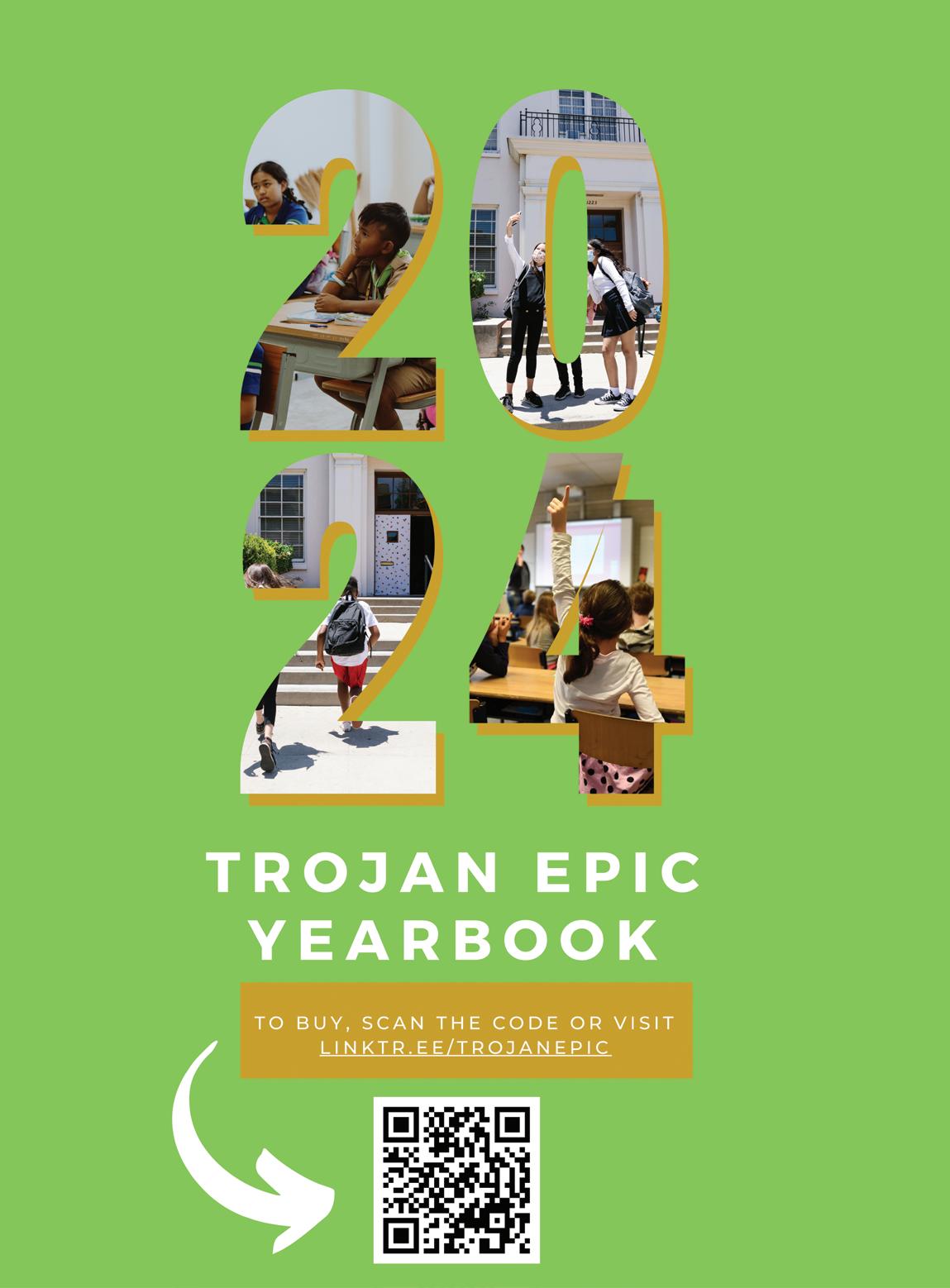


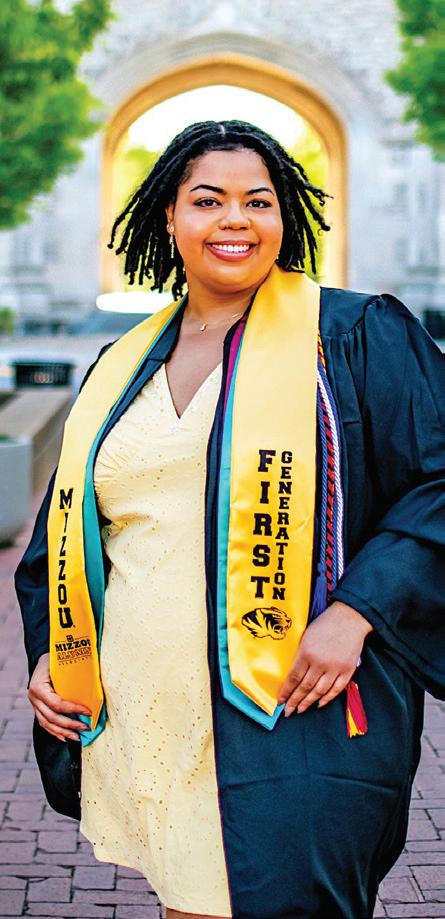







High school students file into classrooms at the start of the school year, brimming with curiosity and anticipation. However, students face a dramatic shift in the educational landscape this year as the first lesson begins. Gender orientation, sex and other possibly controversial topics are missing from school curricula. Over the past few months, Iowa has undergone significant legislative changes in the K-12 education system. Newly enacted laws related to media censorship, curricula changes and LGBTQ+ youth are now enforced within elementary and secondary schools. Although Gov. Kim Reynolds implemented the legislation with the intention of protecting parents’ constitutional right to moderate their children’s education, conflicting viewpoints persist on the legislature’s basis and impacts. Educators and Iowa lawmakers continue to grapple with distinguishing the fine line between exposure and censorship.
Senate File 496, or the “Don't Say Gay” bill, prohibits instruction in public schools on gender and sexual identity from K-6 in all programs and curricula. Books depicting sexual content must be removed from K-12 school libraries, questioning media such as "The Hate U Give," "The Catcher in the Rye," and a staple of English 10, "1984." Ac-
cording to Section 702.17, material containing descriptions or visual depictions of sexual acts is not "age-appropriate." Each school district must establish a comprehensive literary program that aligns with these educational standards by 2024. Iowa City Com munity Schools (ICCSD) librarians collaborate on an extensive spread sheet with a detailed record of which books may violate Section 702.17, and non-compliant texts are then stored.
Andy Ham ’24, whose moth er is Head Librarian Jill Hofmockel, describes the challenges of revising the literature available to West’s student body.
"When students come up and ask, ‘Can I check this book out for my class?’, [my
mom] has to look through each and every book and figure out whether there is a depiction of sex and if it
could be legally challenging; it’s a long process. I know that a lot of



books will have to be pulled by Jan. 1," Ham said.
Of the 200 books flagged for inspection, the ICCSD has removed nearly 50 so far, with more expected to be eliminated. This censorship spans beyond books. Teachers must examine numerous media types that are featured in classrooms, from videos to music.
West faculty, including AP Psychology teacher Travis Henderson, are responsible for complying with the laws in their classrooms.
"We talk about books and movies, [but] it could even be music that depicts a sex act that we can't use anymore," Henderson said.

Ham notes that sexual content is rooted in numerous forms of media, making it difficult to distinguish and remove.
"Sex is depicted in so many different books, plays, movies, shows, everything,” Ham said. “It’s fascinating that now people are getting worried about it and [are debating] things like, ‘What’s the line? What depicts sex in a terrible way, and what depicts sex in an okay way?’"
Ham argues censoring sex is counterproductive, and that access to information is essential for safe practices.
"Regardless of if you want to read [about sex], it’s informative and important for teenagers. If we don’t provide resources like that, people either get hurt or go to worse
sources,” Ham said.
Principal Mitch Gross acknowledges some books that have to be pulled have crucial themes and messages besides sex.
"[The legislation] doesn't differentiate between rape or sexual assault and a consensual sex act," Gross said. "So for example, Maya Angelou’s ‘I Know Why the Caged Bird Sings’—in that book, she explicitly chronicles her being molested by a family member. Now, that book cannot be used, and that's a real disservice to a victim."

House File 802 restricts classroom curriculum regarding critical race theory. The law prohibits instruction on how the legacy of slavery and systemic racism continues to
vidual, by virtue of race or sex, is inherently racist, sexist or oppressive," Gross said. "You can't teach anything in which anyone would feel discomfort, guilt, anguish or any other form of psychological distress because of one's race or sex."

Gross believes these limitations downplay how history shapes current issues.
"It is impossible to ignore the racial injustices that have been at the cornerstone of this country since the 1600s," Gross said. "Teachers are now having to do a real eggshell dance, making sure that they teach facts but also aren't violating the law."
This ban isn’t limited to Iowa. Florida’s Department of Education (FLDOE) ruled to exclude AP African American Studies because the course "significantly lacks educational value." FLDOE also wrote in its curriculum standards that
I THINK AT SOME POINT YOU CAN'T TEACH THE HISTORY THAT PEOPLE WISH HAD OCCURRED. WE HAVE TO TEACH THE HISTORY THAT ACTUALLY OCCURRED.
-WEST HIGH PRINCIPAL MITCH GROSS
enslaved people "developed skills which, in some instances, could be applied for their personal bene-
SF 81 Introduced
Ham agrees, believing that teen- agers should be able to determine how they consume media.
lation]. There hasn't been a public comment [or] administrative rulemaking process yet," Henderson said.
The ambiguity of the legislation makes it difficult for teachers to know where to draw the line, which may cause them to over-censor their curriculum in fear of violating the law and losing their teaching licenses.
Prohibits educators from offering curricula with concepts related to racism/scapegoating.
Jan. 17 SF 305 Introduced
Feb. 15
Prohibits teachers from distributing or teaching “obscene material.”
SF 482 Passed
March 22
Prohibits students from entering restrooms that do not correspond with their biological sex.
SF 496 Passed

May 26
Prohibits instruction of gender and sexual identity from K-6, bans media depicting sexual content in K-12 libraries and mandates parent notifications when a student requests name/pronoun changes.
HF 802 Passed
June 8
Prohibits instruction of critical race theory.’
Source:TheIowaLegislator fit."

"The notion that Florida curriculum now talks about the ‘benefits of slavery’ is just preposterous. It's insulting. It's historically inaccurate," Gross said. "At some point, you can't teach the history that people wish had occurred. We have to teach the history that actually occurred, and the byproducts of that history are oftentimes not flattering and are difficult. But that's even more of a reason why it needs to be taught."
"I under- stand the desire to keep your child safe or to keep them from learning about something dangerous or unhealthy," Ham said. "But at a certain age, children have their own autonomy. If they are just learning, it’s not a problem."
Fern Fraer ’26, a member of the LGBTQ+ community, emphasizes the importance of staying informed.
"The less you're exposed to controversial topics, like gun control and women's rights and transgender issues, the less you're going to care about them," Fraer said.
In Florida, there have been motions to remove material from the AP Psychology exam which tests information about gender identity and sex. The College Board stated that the AP Psychology exam will keep the challenged topics, but Senate File 305 prevents Iowa schools from discussing some sexual content classified as "obscene material."
Henderson has removed sections of his curriculum discussing sexual motivation and its response cycle, as he fears violating the law. He faces another significant challenge with censorship: unclear guidelines. "A lot of districts are left unclear on what we can and can't do. … There hasn't been Department of Education guidance on [the legis-
"[The lack of guidance] obviously leaves people nervous because the law is the law," Henderson said. "The reason people are scared is because it is highly unusual that an enforcement mechanism for a piece of legislation is a teacher's license … It made it personal for a lot of teachers. This is my career; it's my livelihood."
The law's vagueness produced unease in teachers; many West staff members declined an interview, directing West Side Story to the ICCSD administration instead.
ICCSD Director of Community Relations Kristin Pedersen released a statement to WSS on the district’s measures to navigate the legislation, reiterated by ICCSD administrators Carmen Gwenigale and Eliza Proctor.
"[ICCSD] will ensure our compliance with the State's requirement to have a K-12 library and curriculum program, consistent with educational standards, with age-appropriate materials, and supporting student achievement goals," Pedersen said.
Senate File 482 was implemented at the end of last school year, restricting transgender students from accessing bathrooms corresponding to their gender identity. Also in effect is Senate File 496, which

-ANDY HAM ‘24 mandates parental notification when a student requests a name or pronoun change differing from their official school records or when a student self-identifies as transgender or nonbinary.
Fraer believes legislation changes will cause students to conceal their identity.

"[This] legislation will lead to students not being able to present themselves the way they want to, [which] will lead to shame and be
wanting to reach out for help because authority will report them to their parents, who may not be a safe space."
Ham thinks these changes are unwarranted because they result in patrolling LGBTQ+ children.
"The legislation has been horrifying," Ham said. “A lot of people will not be able to be themselves anymore … That doesn’t mean they’re going to not be trans or not be queer, it just means that they will
A 2022 study from the National Library of Medicine found a positive correlation between increased censorship policies of gender and sexual identity within schools and students’ declined psychosocial health. After exposure to such topics, LGBTQ+ students were less likely to engage in suicide-related behaviors, take illicit drugs or feel threatened at school.
Henderson believes the West community is doing its best to provide students with a supportive environment.
"In regards to pronouns and gender-affirming name changes, we started being really conscientious about not putting any students in a position that they don't want to be in," Henderson said. "[We are] trying to focus on relationships and still create an inclusive and welcoming environment, while also giving students the information
For students who feel like West is no longer a safe place, Ham recommends contacting student organizations such as Colors Club, which unites LGBTQ+ individuals and allies within a community. They also acknowledge how most West staff members do not favor the
"In the past four years, almost every teacher I’ve interacted with has been supportive of queer identities,” Ham said. “Even if they can’t support you now, they still see you as a human being; you’re still a person.”
Reach out to a Student Family Advocate or Color’s Club. Dial the Trevor Project at 866-488-7386 or the Mobile Crisis at 855-5818111 for mental health support.

Warning: the contents on this page are purely satirical and should not be taken seriously as they bear a faint resemblance to reality. Unless..
BY MRUDANI RAMKUMAROn Aug. 14, former President Donald Trump was indicted on felony charges related to attempts to overturn the 2020 presidential election results in Georgia. His terrible tweets have also come to light, totaling his indictments to 91 felony counts. We asked how his followers feel about his history and how it will affect his run for presidency in 2024.
“I honestly don’t care about his criminal history. We should be keeping politicians’ personal lives out of our decisions when electing who’s president. It’s not like it’s actually going to affect his presidency,” said Ignoe Rant ’25.
While some have moderate views, others encourage his criminal behavior, claim ing his actions are heroic and stand for all Americans.
“The election was clearly stolen, and the common people can’t see it,” said Terr Oresst ’27. “Trump is just standing up for what’s right, and if he needs more indict ments to do that, then I 100% support it.”
Trump then got his mugshot taken—the first US President to ever receive one. He stated that it was, in fact, beneficial to get his mugshot since any press is good press. However, he still had to pay $200,000 to get on bail and denied all felony counts. Trump then felt the need to give his followers an important message following his arrest.
“As Americans, we have the right to investigate what happened during the 2020 election,” said Trump. “Obviously, trying to invalidate election results and forging documents is a part of democracy.”
With the start of the 2023-24 school year, there have been many new changes at West. For example, administration has cracked down on parking regulations. As such, there’s a possibility that cars parked in the bus lane can be towed.
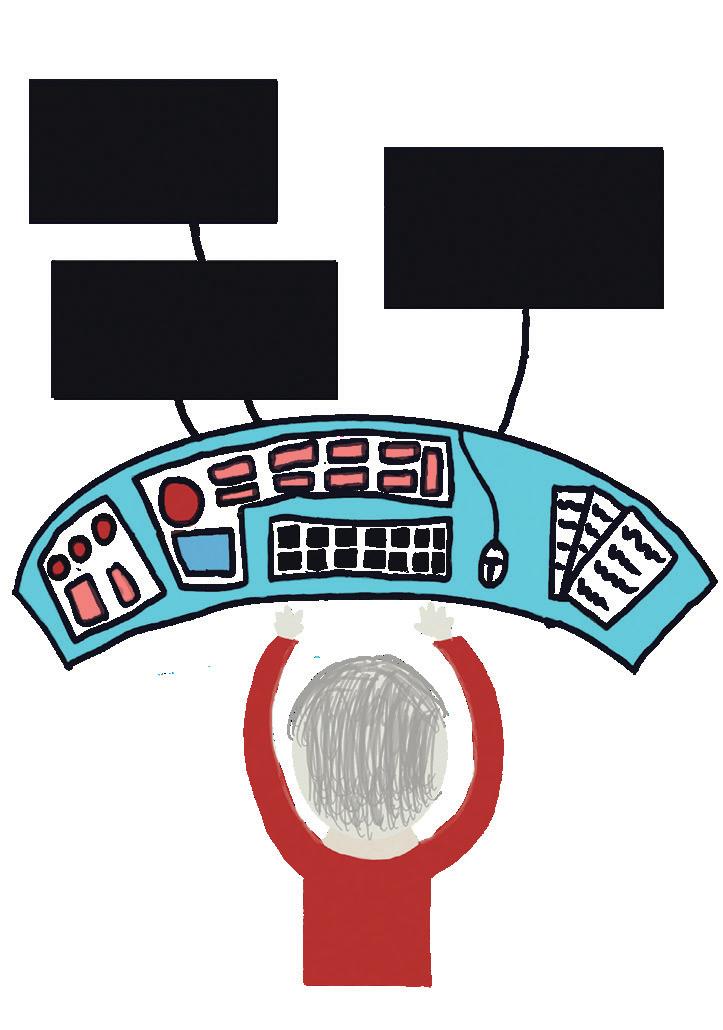
“I’ve been parking in the bus lane so I can get to class as soon as I can,” said Eage Rtolern ’24. “It was really efficient, but because of the new rule, it now takes me five more minutes to get to class.”
Another change is that the West High administration will be watching students from security cameras to figure out who’s leaving trash behind at lunch. While there was considerably less trash at first, students got creative about hiding their trash and started covering the cameras with food.
“My friends and I were just chilling under the staircase, finishing up our lunch when the cameras suddenly started blinking,” said Brek Inruels ’26. “The alarms started going off too, but we were able to stop it after we covered the cameras with baloney.”
The administration implemented similar measures in the lunchroom and saw promising results there. Many students fear the consequences they’ll receive and have been following the rules put in place. Despite that, the number of students hiding around the school to eat lunch has increased. Their attempts have not been successful.
“Remember that we’re always watching,” said Principal Mitch Gross. “We always know what you’re doing.”

On Aug. 23, the first Republican Primary Debate of the year opened on Fox News. There were numerous candidates in attendance, including former Vice President Mike Pence, Gov. Ron DeSantis and entrepreneur Vivek Ramaswamy. Opinions clashed, leaving West students intrigued with where the debate would lead.
“The fact that Vivek Ramaswamy raised his hand first when asked if he would support Trump if he was the party’s nominee says a lot about his character,” said Denn Se ’27. “Despite Trump’s felony conviction, he’s still the best choice, but Vivek is a close second.”
In fact, almost everyone in the debate raised their hand except former Gov. Asa Hutchinson, with former Gov. Chris Christie later putting his hand down as well. While some students found the debate useful, not everyone agreed on whether the candidates would get their vote.

“The whole debate was a mess, and everyone was talking over each other,” said Bai Essed ’25. “I hope the next debate goes better so I can actually learn more about their views on each topic.”
There will be more debates in the future from the Republican Party where people can understand their views better and show us who the potential GOP nominee might be for the Republican party, but at this point, there is no way to tell who it will be.
Trump also had an interview with Tucker Carlson, which was posted on X, formerly known as Twitter, that same day. There, he talked about his decision to skip the debate and how he’s leading for the Republican GOP nominee.
“You see, the polls have come out, and I’m leading by 50-60 points,” said Trump. “And some of the candidates’ points are in the one’s digits. Like, do I really want to sit there for two hours and get harassed by someone who shouldn’t even be running for president?”

With Homecoming just gone by, we reviewed some Spirit Week themes for each day. With the increasingly unique themes, students have come up with interesting interpretations.
“The Spirit Week poster said dress as your type, but I thought they meant your font type,” said Vera Litral ‘24. “My favorite font is Times New Roman so I dressed up as Caesar from the Roman Empire in 49 B.C. I got many weird looks that day.”

During Dress As Your Type Day, the numerous interpretations, one of which included a student bringing in their tractor to the school parking lot after claiming that their type of vehicle is a tractor, forced the school to end the spirit day early. While that day was memorable for many students, others found it fun to dress up, or in the case of Barbie Day, doll up.
“It was Barbie Day and I just knew I had to look like a Barbie doll,” said Dedi Cattid ’27. “It was really hard to take notes when I held my hands in Barbie position all day but it was so worth it.”
There were many Barbies and Kens roaming the halls, and the whole school was divided into two sections: BarbieLand and the Mojo Dojo Casa House. This presented difficulties for the school’s functionality, since the two groups kept disagreeing about who should have control over parts of the school. Finally, the day came to an end, and Spirit Week resolved back to its usual themes.
“I absolutely loved the themes this year, but I think we should stick with sim pler ideas,” said Cat Oius ’25. “We wouldn’t want school to be discontinued or worse, homecoming getting canceled.”
Freshmen state-qualifying swimmer Hannah Geng and all-around volleyball star Sophia Austen reflect on their careers so far.

Q: A: Q: A: Q: A:
Q: A: Q: A:
Q: A:
How and when did you start playing volleyball?
It was my grandma; she brought a volleyball over [to my house] and we started playing. I started playing recreationally, then for the Iowa Rockets club and have played for six years.
What is the biggest tournament you’ve been to?
The biggest tournament is nationals, and [my club team] went the last four years. Last year, we got ninth overall, which is the best that we’ve ever done.
What is it like being on varsity as a freshman?
I was really stressed out before the first game, I was nervous. But the people are really nice. I love my teammates. I love the coaches. It’s just a lot of fun.
What is the hardest aspect of your sport?
[Volleyball] is a mental game, and people don’t understand that. It is like a rollercoaster; you [have] to get down and try to be calm in tough moments.
What has been your happiest moment playing volleyball?
We won [club] state this last season. It went to three sets; we lost the first and then won the last two. It was a lot of fun because we had worked all season for it.
What is your favorite position to play?
Either middle blocker or outside hitter. I played middle for Rockets this past year [and] outside for high school
4th in state in 100y butterfly-58.79s
7th in state in 200y freestyle relay-1:42.65
7th in state in 200y medley relay-1:53.65
Leads in digs: total 108 as of Sept.19
HANNAH
SOPHIA
How did you get into swimming?
My sister started [swimming] when she was ten, so I started when I was 5.
What’s the difference between club swimming and school swimming?
Swimming club is definitely harder. Swimming for school, it’s just more fun. [There are] meets every week in high school, I have three next week. In club, I would probably do three every season.
What has been your happiest moment as a swimmer?
One of my favorite meets that I’ve had was at [Central] Zones Championships when I was 12. We were in Indiana and I was with Team Iowa. It was really fun to hang out with friends from all over Iowa, not just from our club.
What has been your proudest moment while swimming?
My most recent one was probably at Summer State this past summer when I won the 100-meter freestyle. It was a pretty close race. The girl next to me had beaten me in other races, so I just wanted to win that one.
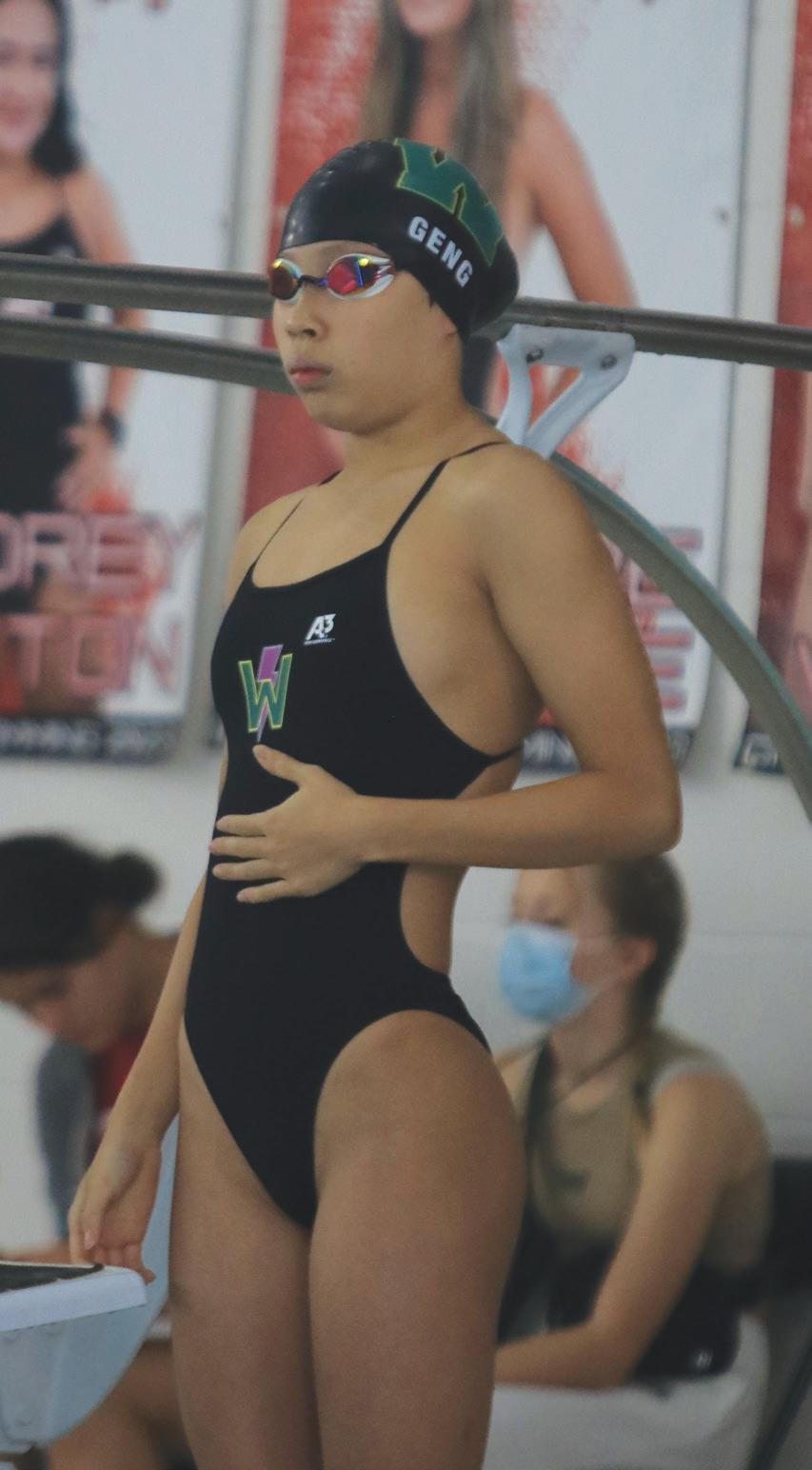
What’s your go-to pregame snack?
I eat fruit snacks at almost every single meet, so probably that, or Chex Mix.
SCAN HERE TO SEE MORE ABOUT THE ATHLETES.

In June, the Supreme Court struck down the use of affirmative action in college admissions. As defined by the Minnesota Department of Public Safety, affirmative action promotes employment and education opportunities for historically disadvantaged minority groups such as women, racial minorities and people with disabilities.
Affirmative action is vital to encourage upward mobility and enhance diversity within college campuses. It serves as an essential tool for addressing the historical injustices of racial discrimination, such as reparations for African Americans. While race should not be the sole determinant in college admissions, it should be considered within a holistic admissions process. Minority students in the United States often grow up in poor socioeconomic environments and have fewer resources to compete against their white counterparts, which may lead to lower test scores or fewer extracurriculars.
Despite being a minority group, affirmative action is viewed as discriminatory towards Asian Americans. According to research conducted by Princeton, Asian-American students who apply to highly selective institutions face significantly higher admission standards than similarly qualified Hispanic and Black applicants. To achieve equal admission chances, Asian Americans need 140 SAT points higher than whites, 320 points higher than Hispanics and 450 points higher than African Americans. There is implicit bias on other aspects of the application, such as Asian-American students needing more extracur-
ricular activities, including sports and playing an instrument—this is known as the “Asian tax.”

It’s essential to recognize that, instead of affirmative action, the greater odds Asian Americans face in college admissions result from societal expectations. The Model Minority Myth plays a role in imposing these unrealistic expectations, perpetuating a stereotype that portrays Asian Americans as inherently successful and high-achieving compared to other minority groups. This stereotype oversimplifies their experiences and undermines the challenges they encounter.
As an Asian-American, I feel pressure to conform to the rigid expectations of others. I recall instances where I have received lower grades for the same quality of work compared to other students with the justification of teachers “expecting more out of me” or “believing I have more potential.” I should be appropriately challenged with my coursework, but it should not come at the expense of my grades and well-being. Growing up as a first-generation immigrant, my parents instilled a strong work ethic that I deeply value. However, my high standards should not be held against me. Asian American students are generally perceived as academically gifted, leading educators to believe they can handle a heavier workload. These expectations can create intense academic pressure and competition for Asian American students, leading to a daunting fear of failure among them, such as myself.
When confronting these unfair expectations, I am not offered the same mental health support as students of other races. The expectation is always to be “on top
ART & DESIGN BY ERINN VARGAof it” or “used to the pressure.” I have been in and out of the counselor’s office, always met with responses that suggested being patient or the stereotype that my family will “come around eventually” rather than receiving the attention my mental health truly deserves. Not recognizing that Asian Americans deserve the same level of mental health support as any other community is blatant racial profiling. According to UCLA Health, Asian Americans are 50% less likely to seek mental health support than other racial groups due to the stigma associated with their mental health issues. Mental health challenges affect individuals irrespective of their racial or ethnic backgrounds, and denying them equal access to care perpetuates harmful biases.
Instead of race, affirmative action should focus on addressing issues like legacy admissions and wealth disparity. Like many critics acclaim, minority status does not always correlate with low socioeconomic status. Although the Model Minority Myth portrays Asian Americans as wealthy, it masks the significant socioeconomic disparities in the Asian American community. My experience growing up in a lower-middle-class family challenges this stereotype; my academic accomplishments were not a result of having access to a tutor or a personal college admissions counselor. I lacked the same resources as others, and, as a first-generation immigrant, I am navigating the college admission process independently.
Complementary to affirmative action, a shift in our perspective regarding Asian Americans is necessary to promote true equity. Asian Americans face not only higher expectations in the college admission process but in everyday life, too.
Affirmative action, due to its ability to provide equity for underrepresented racial groups, should be paired with a change in mindset towards Asian Americans.PHOTO COURTESY OF UNSPLASH
6% of ICCSD students identify as trans or non-binary
50% of trans young people who found their school to be gender-affirming attempted suicide less
62% of trans teenagers don’t find their households “LGBTQ-affirming”
For some, school is a second home, a place where they can fully be themselves, away from their difficult home lives. But now, some students can no longer call school a safe space.
On May 26, the Iowa Legislature instituted a new law affecting students who want to change their names and use alternative pronouns in schools without notifying parents.
Known as Senate File
496, the law states that if a student requests an alternate name or pronoun than legally documented, school staff members must either report them to administration or potentially lose their teaching license. From there, the administration will make a phone call home to let parents know of the changes.
The Iowa City Community School District’s response to this legislation wasn’t enough; there was no formal warning given at the beginning of the school year and a general lack of clear information for students. To ensure that all students receive the same message, it is vital the ICCSD sends out a message to all buildings in regard to the new laws.
West uses Infinite Campus to track students’ information; all name, pronoun and nickname changes have to go through the program. Students don’t have control over these settings, and therefore, have to receive approval from their parents to change them. This system worked fine before the law since teachers could address students as they wanted. Now, for transgender students without accepting families, this forced outing can be a serious issue. This is why, for many students, school is no longer an accepting place where the staff can support them, even if they
want to.
The law creates a culture of disregarding trans students by having to ask “Is this official?” when they want to be called by a new name. Although students who are open about their gender identity at school may be open at home, letting students choose when and where they come out is important for their private lives and establishing a safe space at school. When teachers are forced to report student gender changes, it can feel personal to students who may not have accepting adults at home. The law pressures students into remaining in the closet, adding to the frustration when administration doesn’t actively back the students that they’ve claimed to support.
Despite changes to school and district policies, mandating these reports to parents or
guardians, the ICCSD has not released a public response supporting trans students in their schools. When West Side Story emailed district
administrators, we only received legal assurance that they would follow the law. While it’s good to have clarity with students, officials also need to make statements about the policy, specifically supporting students affected by it and clarifying what they have to report. The current lack of meaningful statements leaves students out to dry and isn’t helpful for those who may already be struggling with non-accepting families. Taking away supporting community members and a safe space shouldn’t be brushed over. Although some teachers have made individual statements about this law, the larger institutions have yet to.
The ICCSD needs to tell students about the law regarding new policies and their support for students. While West has some communities or classes that have discussed the law, not every student knows about it. A simple message at the beginning of the year would have helped a lot. Even now, an official message stating that the district wants to stand with students would be a good sign.
With the lack of response from authorities, students can feel abandoned by schools that want to support them, while being surrounded by potential issues at home. With these issues being prevalent, it’s more pressing than ever for administration to reinforce their support for students and to spread the word about what new policies are being enacted.
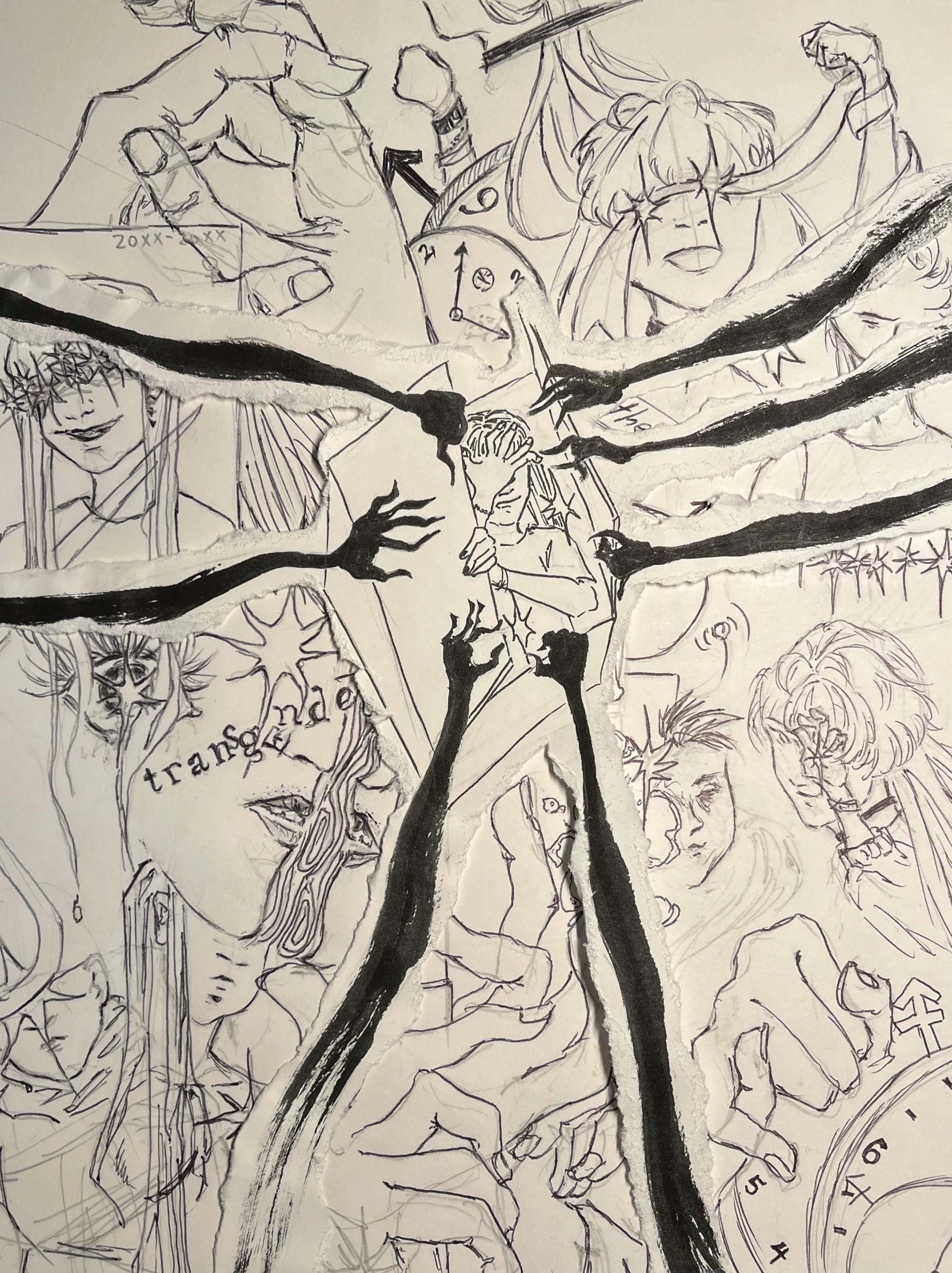
 Finnley Bonfig ‘26 and coach John Cooper showcase the Speech and Debate trophies at West High’s annual club fair Sept. 13.
Wesal Haroun
Finnley Bonfig ‘26 and coach John Cooper showcase the Speech and Debate trophies at West High’s annual club fair Sept. 13.
Wesal Haroun
Answer these questions and follow your choices to a sweet, fall inspired treat. Find the recipes online with the QR code.
BY GINGER MCCARTNEYALONE OR WITH FRIENDS? ALONE OR WITH FRIENDS?

DID YOU EVER GO (AND ACTUALLY ENJOY) TRICK OR TREATING?
DID YOU EVER GO (AND ACTUALLY ENJOY) TRICK OR TREATING?
NUTMEG OR CINAMMON?
NUTMEG OR CINAMMON?
TWIX OR HERSHEYS?
TWIX OR HERSHEYS?
SMASHING PUMPKINS OR FIONA APPLE?
SMASHING PUMPKINS OR FIONA APPLE?

DOES THE OVEN SCARE YOU?
DOES THE OVEN SCARE YOU?